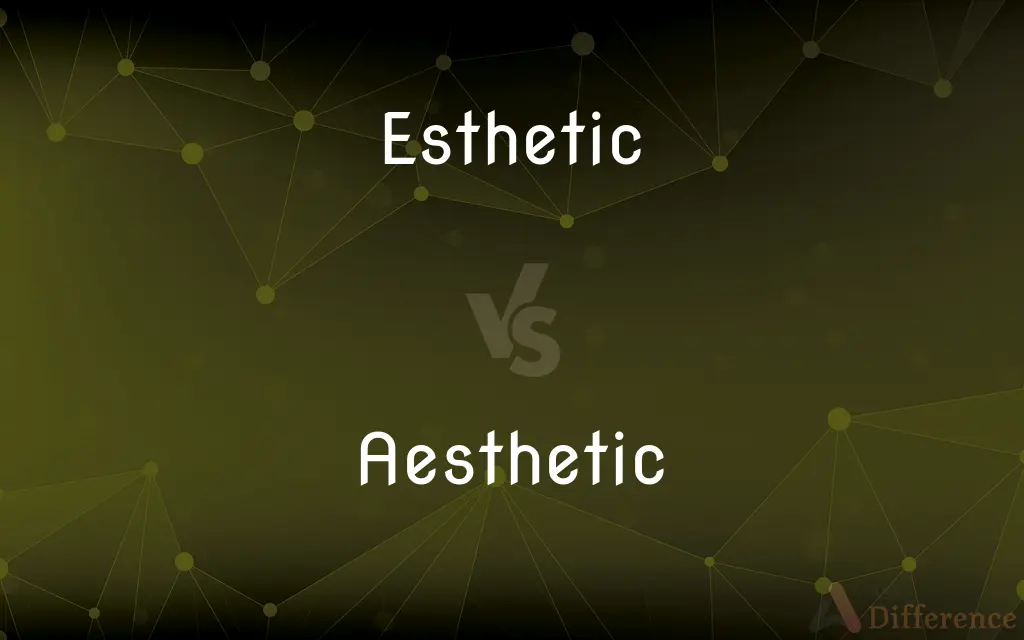Esthetic vs. Aesthetic — What's the Difference?
By Tayyaba Rehman — Updated on July 20, 2023
"Esthetic" and "aesthetic" essentially mean the same - concerned with beauty or the appreciation of beauty. The difference lies in regional spelling: "aesthetic" is preferred in British English, while "esthetic" is more common in American English.

Difference Between Esthetic and Aesthetic
Table of Contents
ADVERTISEMENT
Key Differences
"Esthetic" and "aesthetic" essentially mean the same thing, both referring to principles or notions of beauty and art. They are frequently used in conversations about the nature and appreciation of beauty and in discussions related to design, art, and culture.
"Esthetic" is the American English variant, while "aesthetic" is the British English version. U.S. English often simplifies spellings, as seen in this case, but both spellings are recognized and understood internationally.
The word "aesthetic" is often used in philosophical discourses, specifically when discussing matters related to the philosophy of art. Conversely, "esthetic" is typically seen in a more casual or general context, such as the field of cosmetology, where it often refers to the visual appeal of something or someone.
Comparison Chart
Definition
Refers to the appreciation or criticism of what is visually pleasing or artistic
Also refers to the appreciation or criticism of what is visually pleasing or artistic
Origin
Derived from American English
Derived from British English
ADVERTISEMENT
Usage
More common in American English
More common in British English, though widely accepted in American English as well
Spelling
The first letter is 'E'
The first letter is 'A'
Examples
Esthetic judgement, esthetic preferences
Aesthetic philosophy, aesthetic surgery (another term for cosmetic surgery)
Fields of use
Often used in medical context in the US, like "esthetic dentistry"
Used across a range of disciplines including philosophy, art, and criticism
Compare with Definitions
Esthetic
(philosophy) A philosophical theory as to what is beautiful.
He despised the esthetic of minimalism.
Aesthetic
Of or concerning the appreciation of beauty or good taste.
Aesthetic judgment.
The aesthetic appeal of the exhibit.
Esthetic
The philosophy of beauty and art in all its forms.
His approach to landscaping centered on the esthetic, resulting in breathtaking garden designs.
Aesthetic
Being or relating to a work of art; artistic.
The play was an aesthetic success.
Esthetic
The principles guiding the work of an artist or artistic movement.
Abstract expressionism, with its emphasis on emotion, represented a radical shift in esthetic.
Aesthetic
Relating to the philosophy or theories of aesthetics.
Esthetic
(American spelling) Aesthetic.
Aesthetic
Characterized by a heightened sensitivity to beauty.
The poet and his aesthetic friends.
Esthetic
The visual or sensory characteristics that define a particular style or design.
His home reflected a minimalist esthetic with its clean lines and subdued colors.
Aesthetic
Often aesthetic of or characteristic of aestheticism in the arts.
Esthetic
Variant of aesthetic.
Aesthetic
A guiding principle in matters of artistic beauty and taste; artistic sensibility.
"a generous Age of Aquarius aesthetic that said that everything was art" (William Wilson).
Esthetic
Relating to or dealing with the subject of aesthetics.
Esthetic values.
Aesthetic
An underlying principle, a set of principles, or a view often manifested by outward appearances or style of behavior.
"What troubled him was the squalor of [the colonel's] aesthetic" (Lewis H. Lapham).
Esthetic
The branch of philosophy that deals with the nature and expression of beauty.
Her studies in philosophy led her to a deep fascination with the esthetic, particularly as it related to the human form.
Aesthetic
Concerned with beauty, artistic impact, or appearance.
It works well enough, but the shabby exterior offends his aesthetic sensibilities.
Esthetic
Concerning or characterized by an appreciation of beauty or good taste.
Aesthetic
Beautiful or appealing to one's sense of beauty or art.
The design of the lobby cannot be considered particularly aesthetic.
Esthetic
Aesthetically pleasing.
Aesthetic
The study of art or beauty.
Esthetic
The appreciation or critique of visual or sensory elements.
The museum's esthetic appeal was evident in the way visitors admired the exhibits.
Aesthetic
The artistic motifs defining a collection of things, especially works of art; more broadly, their aura or “vibe”.
I really like the goth aesthetic you've got going there.
Aesthetic
Of or pertaining to aesthetics; versed in aesthetics; as, aesthetics studies, emotions, ideas, persons, etc.
Aesthetic
(philosophy) A philosophical theory as to what is beautiful.
He despised the aesthetic of minimalism.
Aesthetic
Relating to or dealing with the subject of aesthetics.
Aesthetic values
Aesthetic
Concerning or characterized by an appreciation of beauty or good taste.
The aesthetic faculties
An aesthetic person
Aesthetic feeling
Aesthetic
Aesthetically pleasing.
Aesthetic
Attractive or appealing.
The most aesthetic features of the building.
Aesthetic
(Informal) Conforming to accepted notions of good taste.
Aesthetic
That which appeals to the senses.
Common Curiosities
What is esthetic art?
Esthetic art refers to artwork that prioritizes beauty and sensory appeal, often focusing on pleasing colors, shapes, textures, or moods.
Does aesthetics mean beauty?
Aesthetics does not solely mean beauty. It is a philosophical study concerning the nature and appreciation of art, beauty, and taste, involving the creation and appreciation of beauty.
What is aesthetic thinking?
Aesthetic thinking refers to a way of perceiving and understanding the world through the senses, emotions, and intuition, often associated with creativity, artistry, and the appreciation of beauty.
What are examples of aesthetics?
Examples of aesthetics could include specific visual styles like Minimalism, Surrealism, or Goth, or it could refer to the pleasing design of everyday objects, like a sleek smartphone or a well-plated meal.
What is an example of esthetics?
An example of esthetics could be the principles guiding a designer as they choose colors, textures, and shapes to create a visually pleasing room.
What is the opposite of aesthetic?
The opposite of aesthetic could be "unaesthetic" or "unattractive," referring to something that lacks beauty or sensory appeal.
What does be esthetic mean?
To be esthetic means to appreciate or create beauty, to value sensory experiences, and to seek out environments, objects, or experiences that are pleasing to the senses.
What is aesthetic color?
An aesthetic color refers to a color or palette of colors that are used consistently to create a pleasing and coherent visual style or mood.
What is aesthetic in psychology?
In psychology, aesthetics refers to the study of why we perceive certain things as beautiful or appealing, often examining the emotional responses, cognitive processes, and cultural factors that influence our tastes and preferences.
What is aesthetic Behaviour?
Aesthetic behavior refers to actions or habits driven by an appreciation for beauty and art, such as visiting museums, reading poetry, or curating one's personal style.
Is it aesthetic or esthetic?
Both 'aesthetic' and 'esthetic' are correct. 'Aesthetic' is more commonly used, particularly in British English, while 'esthetic' is an American variant.
What is esthetic attitude?
An esthetic attitude refers to a mindset or approach to life that values beauty, sensory pleasure, and artistic experiences.
What does my esthetic mean?
Your esthetic refers to your personal sense of beauty or taste, including your preferences for visual, auditory, or sensory stimuli that bring you enjoyment or satisfaction.
Who is called aesthetic?
An aesthetic person is someone who is dedicated to the pursuit of beauty or who has a high appreciation for the arts and the sensory experiences associated with them.
What is esthetic personality?
An esthetic personality refers to someone who has a deep appreciation for beauty, art, and sensory experiences, often expressing this through their personal style, hobbies, or career.
What is esthetic synonym?
A synonym for esthetic could be 'artistic' or 'tasteful.'
What is aesthetic in skincare?
Aesthetic in skincare refers to the appearance and health of the skin, usually associated with a specific skincare routine or regimen designed to improve and maintain the beauty of the skin.
Does aesthetic mean style?
The aesthetic can refer to a style, particularly in contexts like fashion, design, and art, where it signifies a distinctive and consistent look or feel that aligns with a particular taste or philosophy of beauty.
What is a cool word for aesthetic?
A cool synonym for aesthetic could be "artistic."
What is aesthetic photos?
Aesthetic photos are images that are designed or chosen for their beauty or artistic appeal, often with a distinctive style, color palette, or mood.
What is esthetic life?
An esthetic life refers to a life that prioritizes and values beauty, art, and sensory experiences, often expressed through personal style, home decor, and hobbies.
What are esthetic values?
Esthetic values are the principles or standards used to determine what is beautiful or pleasing in art, design, or other sensory experiences.
Why is it called aesthetic?
The term 'aesthetic' originates from the Greek word 'aisthetikos,' meaning 'perceptive.' It was first used in the 18th century to refer to a philosophical study of beauty and art.
What is aesthetic creativity?
Aesthetic creativity refers to the ability to generate ideas or produce work that is both novel and pleasing to the senses or emotions, often in the fields of art, design, music, or literature.
What are the 4 types of aesthetics?
The four major aesthetics often referred to in philosophy and art are Realism, Formalism, Imitationalism, and Emotionalism.
Share Your Discovery

Previous Comparison
Cloak vs. Coat
Next Comparison
Dyslexia vs. LysdexiaAuthor Spotlight
Written by
Tayyaba RehmanTayyaba Rehman is a distinguished writer, currently serving as a primary contributor to askdifference.com. As a researcher in semantics and etymology, Tayyaba's passion for the complexity of languages and their distinctions has found a perfect home on the platform. Tayyaba delves into the intricacies of language, distinguishing between commonly confused words and phrases, thereby providing clarity for readers worldwide.
















































